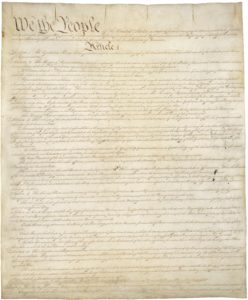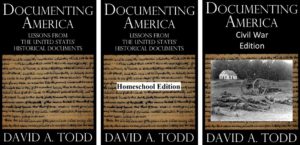
As I mentioned in a previous post, as I’m going through the source documents for Documenting America: Making the Constitution Edition, much good material gets edited out. It winds up on the cutting room floor, so to speak, using the movie industry term. Some of this is good material. I’d love to use it in my book, but, alas, I need to keep the book a reasonable size.
The thought came to me to use it for blog post material. So, instead of just dumping it, I’ve been saving it for use when it’s time to write a blog post and I have nothing else in mind. It could also be newsletter material, I suppose, if I ever take the plunge to writing a newsletter.
But, again alas, something I put into a file last week, from one of the Federalist Papers, is now nowhere to be found. What did I do with it? Did I save it to my Documenting America Vol 3 folder? It’s not there. Did I save it to my Blog folder? It’s not there either. Maybe, without paying attention, I saved it to the root folder of my Documents. Nope, not there either. Did I fail to save it and let it go drifting off into the ether?
Whatever, the excellent item I was going to use for today is not on my computer. I could spend an hour looking for it, but think, instead, I’ll find something else. I saved other stuff.
Here’s one from an anonymous writing from someone from Pennsylvania who didn’t like the proposed constitution.
The wealthy and ambitious, who in every community think they have a right to lord it over their fellow creatures, have availed themselves, very successfully, of this favorable disposition; for the people thus unsettled in their sentiments, have been prepared to accede to any extreme of government; all the distresses and difficulties they experience, proceeding from various causes, have been ascribed to the impotency of the present confederation, and thence they have been led to expect full relief from the adoption of the proposed system of government, and in the other event, immediately ruin and annihilation as a nation. These characters flatter themselves that they have lulled all distrust and jealousy of their new plan, by gaining the concurrence of the two men in whom America has the highest confidence, and now triumphantly exult in the completion of their long meditated schemes of power and aggrandisement.
Whoever wrote this, a small part of a much longer article, was, I think, spot on concerning what happens when power is obtained and then applied to government. Wealthy and ambitious people do tend to lord it over their fellow citizens. They are successful, often from their own work, and they see this as a reason why they should 1) be held in high esteem by others, and 2) have positions of political power.
The writer of the original document seems to have been wrong, however, about the motives of those who wrote the Constitution and about how the government would function under it. Things turned out much better than his dire predictions. He knew things weren’t going well under the Articles of Confederation, and saw this new document as setting up a government of the rich and powerful. I believe most of our 232 year experience with it shows us that this isn’t so.

Or is it? As I look on Congress today, I see lots of multi-millionaires. I see people who make laws that apply to others but not themselves. I see the rich and powerful say the government should take over your health care while they keep a very nice plan for themselves. Same with pensions and Social Security.
I could go on and on. Can you tell I’m not a big fan of Congress? I think most of the ills in the nation that are often attributed to the president—every president, no matter who it is—are often the fault of Congress, either due to their action or inaction.
So why didn’t this particular passage make it into my book? Simply a matter of space. This document, like all of them I’m using in the book, is chock full of good phrases and arguments. Some turned out to be wrong arguments, some right. It’s all worth reading. If someone reads Documenting America and then digs into the source documents, they’ll see this. All the better. If they don’t, this will remain obscure and unread.
Perhaps my book and this blog will help others to find and read it.
They sure could write run-on sentences in the old days. By the time you get to the end you’ve forgotten the beginning. CHSE English teachers didn’t let us get away with that.
Yes, those are difficult sentences sometimes. When I quote them in my book, I fiddle just a little. I modernize the punctuation, which actually helps a great deal in the reading. I add paragraph breaks, which they seemed almost unware of back then. And I take compound sentences linked by a colon and cut them into two sentences. That also helps with the reading.